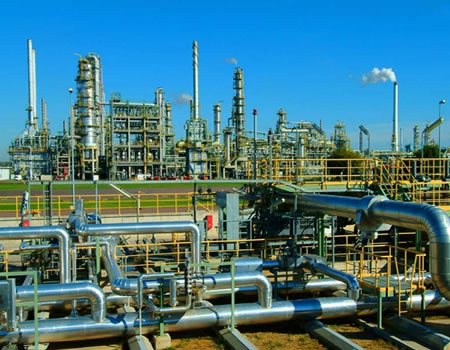Despite the billions of dollars expended by the Nigerian National Petroleum Corporation (NNPC) on Turn Around Maintenance (TAM) over the last 25 years, Nigeria’s four refineries have remained comatose, operating at between zero and 20.66 per cent of their installed capacity of 445,000 barrels per day, thus forcing the country to rely mostly on fuel importation to meet the daily requirement of 750,000 barrels, Nigerian Tribune investigations have revealed.
Succeeding governments have invested a huge fortune on the refineries with a view to shaping them up to satisfy the Premium Motor Spirit (petrol) and other petroleum product needs of the country, but the oodles of money spent on the refineries have not produced the desired result.
Findings by the Nigerian Tribune revealed that on Turn Around Maintenance for the refineries, the Federal Government spent $216 million between 1993 and 1998, $92million between 1998 and 1999, $1.57 billion between 1999 and 2007, $200 million in 2009, $900million in 2012, $1.6billion in 2013, $550million in 2015 and $50million in the current year.
But despite the huge spending, the refineries have failed to live up to expectation, consequently, according to Central Bank of Nigeria (CBN’s) statistics, Nigeria, the fifth largest exporter of crude oil in the world, spent $36.37 billion on petroleum products importation between 2013 and 2017.
Similarly, the deplorable state of the refineries, which resulted in inadequate fuel supply, also occasioned a huge loss of about N10 trillion to fuel subsidy between 2006 and 2018 as the Federal Government had to pay the difference between the landing cost of imported PMS and the pump price. The situation has not improved as the NNPC still bridges the gap between the two to make PMS available to end users at N145 per litre.
The nation’s four refineries have different capacities. The Port Harcourt Refining Company, made up of two refineries, has a capacity of 210,000 barrels per day, the Warri refinery has a capacity of 125,000 barrels per day, while the Kaduna refinery has a capacity of 110,000 barrels per day, totaling 445,000 barrels per day.
However, according to the NNPC Monthly and Financial Report for the Month of January 2019, the performance of the refineries does not give any room for cheers. In January 2018, the four refineries’ consolidated capacity utilization was 10.89 per cent (48,460.5 barrels). In February, it was 13.94 per cent (62,033 barrels), in March, it was 14.41 per cent (64,124.5 barrels) and in April, it was 7 per cent (31,150 barrels).
In May, the refineries collectively achieved 20.12 per cent capacity utilization, producing 89,534 barrels, in June, the capacity utilization was 20.66 per cent (91,937 barrels), in July, it was 4.83 per cent (21,493.5 barrels), and in August, it was 3.02 per cent (13,439 barrels).
The capacity utilization of the four refineries for September and October 2018 was 0.00 per cent, while it was 0.67 per cent (2,981.5 barrels) in November, 3.57 per cent (15,886.5 barrels) in December 2018, and 5.55 per cent (24,697 barrels) in January 2019.
Consequently, aside not giving value for the humongous amount of money spent on their maintenance, the refineries have also been trading at a loss, according to NNPC reports, their operating deficit in 2018 increased by 39 per cent compared to that of 2017.
For the 2018 trading year, Port Harcourt refinery posted a loss of N59.96bn, Warri refinery posted N41.71 billion loss, while Kaduna refinery recorded N31billion loss.
According to the NNPC Refineries Performance Reports of 2012, the decline in the performance of the refineries commenced in the early 1990s after the military government directed the NNPC to close its accounts in commercial banks and transfer them to the CBN. With that, NNPC lost its autonomy and it could no longer embark on prompt maintenance of the refineries.
However, every succeeding NNPC GMD has made turning around the refineries a cardinal goal.
Shortly after his assumption of office in 2015 as NNPC Group Managing Director, Dr Ibe Kachikwu promised to turn around the fortune of the four refineries and as well build new refineries. However, Kachikwu, who later became the Minister of State for Petroleum and consequently chairman of the NNPC board, admitted at the tail end of his tenure as a minister that he did not deliver on those promises.
ALSO READ: Security: Obasanjo writes to Buhari, calls for national debate
Dr Maikanti Baru, the immediate past GMD of NNPC, also made promises about improving the state of the refineries but not much was accomplished in that regard.
Last week, at his inauguration as the new GMD of NNPC, Mr Mele Kyari, said, “We will deliver all our four refineries within the life of President Muhammadu Buhari’s administration. We shall seek strategic partnerships to ensure Nigeria becomes a net exporter of petroleum products.”
But while speaking with the Nigerian Tribune on what to do with the refineries, Mr Peter Esele, former President of the Petroleum and Natural Gas Senior Staff Association of Nigeria (PENGASSAN), said, “We have always told the government that expending the money we do not have on the refineries is not the way to go. I remember when I was PENGASSAN President, we recommended that the government should sell part of the refineries to private investors so that they would be properly managed. We actually suggested 51:49, with the private investors, the international oil companies (IOCs), owning 51 per cent of the refineries while the government, through the NNPC takes 49 per cent. With that arrangement, the refineries would be profitably managed and the government would make a lot of money. The NLNG model is the best. The company is well managed and the government makes a lot of money from dividends. The same thing is happening with Indorama Eleme Petrochemicals Company. Since its privatization, it has been yielding dividends to the Federal Government. It is surprising why the government has been vacillating over this matter for so long. It is the best thing.”
Speaking in a similar vein, Dr Michael Asobi, a petrochemical expert said, “From all indications, the government is not fit for the role of managing the refineries. The refineries have become a drainpipe on the nation’s resources. The earlier the government let go of them and allow those with competence to manage them, the better for the country.”
Asobi added that if the government wants to sell the refinery it is best to do so before Dangote’s refinery comes on stream. “Once Dangote’s refinery becomes functional, getting to sell the refineries even as scrap would be herculean.”
WATCH TOP VIDEOS FROM NIGERIAN TRIBUNE TV
- Let’s Talk About SELF-AWARENESS
- Is Your Confidence Mistaken for Pride? Let’s talk about it
- Is Etiquette About Perfection…Or Just Not Being Rude?
- Top Psychologist Reveal 3 Signs You’re Struggling With Imposter Syndrome
- Do You Pick Up Work-Related Calls at Midnight or Never? Let’s Talk About Boundaries






